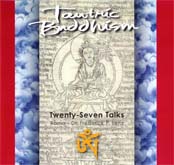
Tantric Buddhism
Metaphysics
As objective perceivers, we have a sense of who we are.
We have a sense that we are a person with ideas, history - we are who we are. You know who you are; you are whoever you happen to be. However you see yourself is how you are. That's all it is.
And we have a sense - unless you've been involved with metaphysics for a long time, unless you've been practicing Buddhism for a long time, and not just in time, but I mean you've done something with the practice, you've evolved - until that has happened, we have a sense that we choose to do what we do in life. We have a definitive sense that, "Well, I've chosen to do this. That's why I'm doing it. I'm meditating, I'm involved with the spiritual quest, I'm exploring other dimensional realities, I'm exploring enlightenment, I'm trying to become happy and free from pain or guilt or depression or various ailments of the psyche, I want endless ecstasy," whatever it might be.
But we have a sense that we are participating in metaphysics and the metaphysical experience voluntarily. We're doing it because we're doing it. We've chosen to do it.
As you go much further in metaphysics, you discover that that's not true at all. The reason that you're engaged in metaphysics is - there's no reason, you just don't have any choice. You couldn't stop, no matter what you did. You're held by power. Now, this is a very different view of life. In other words, we believe that we are all - people are created equal and we have free choice and all that sort of thing. It's very big these days - on the earth - the idea that you can just go get yourself a four-wheel drive and a cute guy or girl and a house and a job and you can kind of do what you want to. This is very American, but - very egotistical, very centered around self.
I like independence and I like that idea, but to be honest with you, in metaphysics, we see as metaphysicians, we perceive that it isn't really we who ever decide anything. It's power that decides things. It's power, if I can enter into the world of the American Indians for just a little bit here, who believe that there's a force that binds life together. There's something that makes everything what it is, and we call it power. In Buddhism, I guess we'd call it karma. But let's be American Indians for a minute, since we're in America. They were here first.
Power. Power binds us to something. You see two people together. They're in a relationship. They don't like each other; they're bored with each other. Why do they stay together? "Well," they'll say, "because, God, I wouldn't know what else to do. I really don't want to meet someone else; it's inconvenient. We have children," whatever it is.
But it's really power that holds those people together. And when the designs of power change, those people will separate and there's nothing they can do in the meantime about it. There's not a thing they can do. Nothing. Zero.
Now this goes, again, contrary to the grain of the American and pretty much the common 20th, 21st century view of life where we can all just do what we want to. We can start a factory, we can drive a car, we can make our life what we would like it to be. But the ancients believed that that isn't true. Within a certain framework, within certain parameters, there is free choice. But the parameters, we have no choice about. Where we're born, the conditions - we don't choose that, it just happens. Beyond that, we just think we're choosing.
But there's a power that brings us to things, and there's a power that lets us move away from things, from people, places, experiences. And what you learn to do in metaphysics is to accept.

